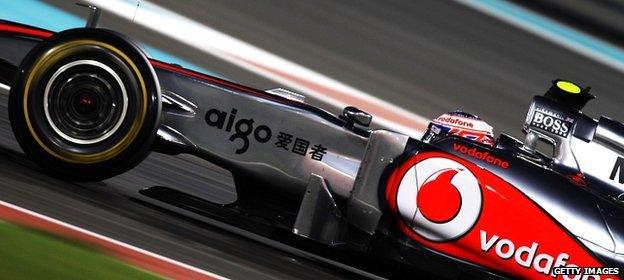Engineering prize to be worth £1m
- Published

Lord Browne points out that engineering underpins every aspect of our lives
A £1m prize - named after the Queen - is to be awarded for exceptional advances in engineering.
The prize, funded by an endowment from a number of engineering companies, will be awarded biannually to an individual or team of up to three people.
It is designed to raise the profile of engineering and the recipients can be of any nationality.
The Queen Elizabeth Engineering Prize was officially launched at London's Science Museum on Thursday.
It was attended by the Prime Minister, Deputy Prime Minister and the leader of the opposition, to show cross-party support.
The fund behind it will be managed by an independent trust that is chaired by Lord Browne, president of the Royal Academy of Engineering and a former chief executive of BP.
But the award organisers will not disclose how much money they have raised, saying only that they have received long-term commitments.
Commenting on the prize, Lord Browne said engineering "underpins every aspect of our lives", adding that it forms a "bridge between scientific discovery and commercial application".
He added: "Too often the engineers behind the most brilliant innovations remain hidden. The Queen Elizabeth Prize aims to change that. It will celebrate, on an international scale, the very best engineering in the world."
Prime Minister David Cameron: ''We don't do enough to recognise engineering''
The Prime Minister, David Cameron, commented: "I am delighted that the Queen has put her name to this prestigious prize, which I hope will carry the same stature as the Nobel Prizes."
"For too long Britain's economy has been over-reliant on consumer debt and financial services. We want to rebalance the economy so that Britain makes things again - high-skilled, high-value manufacturing and engineering should be a central part of our long-term future."
According to campaigners Engineering UK, there are upwards of 550,000 engineering companies in the country, but they are facing a major shortfall in the workforce.
This shortfall of engineers is estimated to reach about 600,000 by 2017, they say.
'Significant benefit'
Imran Khan, director of the Campaign for Science and Engineering (Case), said the prize was a "fantastic way" to raise the profile of science and engineering as a driver of economic growth.
But he explained: "Our research base and workforce need to be the best in the world in order to compete - the current cuts we're seeing to science and engineering will hamper that.
"None of the main political parties have yet put science and engineering at the heart of their economic plans, and we hope that today's announcement will see that beginning to change."
The Deputy Prime Minister, Nick Clegg, said the prize "flies in the face of the myth that engineering is a part of Britain's past... We are bringing engineering home".
The Labour leader Ed Miliband said: "We now face huge global challenges in the future ranging from climate change and famine to an ageing population in the West. Just as engineering has helped us meet the big challenges in the past, it will be engineering that helps us meet these new challenges."
Tim Routsis, the chief executive of engineering firm Cosworth welcomed the prize, saying it would "shine a light" on the vital role of the discipline to the UK economy.
"Will the Queen Elizabeth Award carry the same stature as the Nobel Prizes? Not until engineering is better understood," he said, adding: "And certainly not while there are so many talking about UK engineering as if it died out decades ago."
The organisers said the prize would be awarded for "a groundbreaking advance in engineering which has created significant benefit to humanity".
- Published8 June 2010